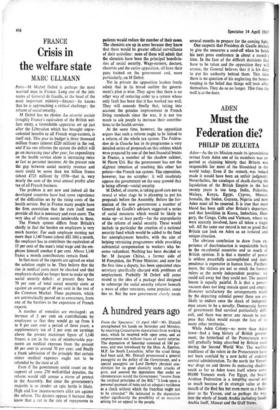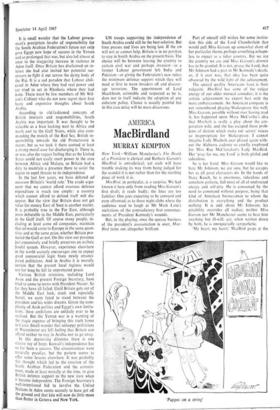Must the Federation die?
ADEN PHILIP DE ZULUETA
Aden—As the UN Mission made its ignominious retreat from Aden one of its members was re- ported as claiming bitterly that Britain was responsible for most of the. bloodshed in the world today. Even if the remark_ was indeed made it would have been an unfair judgment. Nevertheless, the catalogue of death during the liquidation of the British Empire in the last twenty years is too long. India, Palestine, Malaya, Kenya, Egypt, Cyprus, Muscat, Somalia, the Sudan, Guyana, Nigeria and now Aden must all be counted. It is true that most blood has been spilt after Britain's departure, and that hostilities in Korea, Indochina, Hun- gary, the Congo, Cuba and Vietnam, where we were scarcely involved, have all taken a tragic toll. All the same our record is not so good that Britain can look on Aden as an isolated and unique situation.
The obvious conclusion to draw from ex- perience of decolonisation is unpalatable both to the ex-colonial countries and to much of British opinion. It is that a transfer of power is seldom peacefully accomplished and inde- pendence is expensive in human lives. Further- more, the victims are not so much the former rulers as the newly independent peoples : we could sail away but they could not. The second lesson is equally painful. It is that a power- vacuum does not long remain quiet and empty. However satisfactory the arrangements made by the departing colonial power these are un- likely to endure once the shock of independ- ence ceases to be a novelty. Democratic forms of government find survival particularly diffi- cult, and there was never any reason to sup- pose that Aden would escape the fate of so many other territories.
While Aden Colony—no more than Aden town—had a long history of British govern- ment, the hinterland of the Protectorate was still gradually being absorbed by Britain even during the Second World War. The warlike traditions of the rulers in the Protectorate haNe not been overlaid by a new habit of ordered central administration. To the north the Yemen war drags on and throws its menacing shadow south as far as Aden town itself where some 80,000 Yemenis work. For Egypt, the South Arabian Federation is a tempting morsel not so much because of• its strategic value at the mouth of the Red Sea but even more as- a back- door to the Yemen, and so perhaps the way into the whole of South Arabia incffiding Saudi Arabia itself, Muscat and the Gulf States. It is small wonder that the Labour govern- ment's precipitate lavabo of responsibility for the South Arabian Federation's future not only gave Egypt new hope of success in the Yemen and so prolonged that war, but also led almost at once to the staggering increase in violence in Aden itself. Once Britain has disclaimed an in- terest she had also invited her potential suc- cessors to fight it out across the dying body of the Raj. It is a sad paradox that Labour abdi- cated in Aden where they had real power and yet tried to act in Rhodesia where they had none. There must be few members of Mr Wil- son's Cabinet who do not now regret their first hasty and expensive thoughts about South Arabia.
According to old-fashioned concepts of British interests and responsibilities, South Arabia was important. It was thought to be valuable as a base looking west to Africa and north east to the Gulf States, while also com- manding the mouth of the Red Sea. British re- sponsibility towards the old Protectorate is recent, but as we took it there seemed at least a strong moral case for discharging it. There is, or was, also the vaguer feeling that as the United States could not easily exert power in the area between Africa and Malaya, so Britain had a duty to maintain a presence there to assist the region to repel threats to its independence.
In the last few years, we have debated ad nauseam Britain's 'world role.' The crude argu- ment that we cannot afford overseas defence expenditure is much too simple: a country which cannot afford to defend itself will dis- appear. But the view that Britain does not get value for money East of Suez is another matter. It is probably true in the Far East, although more debatable in the Middle East, particularly in the Gulf itself. Of course many people, in- cluding at least some oil companies, maintain that oil would come to Europe in the same quan- tities and at the same price, whether Britain pro- tected the Gulf or not. On this view our presence just expensively and briefly preserves an archaic feudal system. However, experience elsewhere in the world scarcely encourages one to expect good commercial logic from newly emanci- pated politicians. And in Arabia it is morally certain that the present local regimes would not for long be left in unprotected peace.
Various British ministers, including Lord Avon and the present Foreign Secretary, have tried to come to terms with President Nasser. So far they have all failed. Until Britain gets out of the Middle East lock, stock and especially barrel, we seem fated to stand between the president and his wider dreams. Given the com- plexity of Arab politics and Egypt's own limita- tions, these ambitions are unlikely ever to be realised. But the Yemen war is a warning of the tragic expense of bringing this truth home to Cairo. Small wonder that unhappy politicians at Westminster are left feeling that Britain can afford neither to stay in Arabia nor to go away.
In this depressing dilemma there is one elusive ray of hope. Kuwait's independence has so far been a success. The circumstances were naturally peculiar, but the pattern seems to offer some lessons elsewhere. It was probably this thought which led to the creation of the South Arabian Federation and the commit- ment, made at least morally at the time, to give British defence support to the new state when it became independent. The Foreign Secretary's well-intentioned bid to involve the United Nations in Aden seems scarcely to have got off the ground and that kite will now do little more than flutter in Geneva and New York.
UN troops supporting the independence of South Arabia could still be the best solution. But time presses and lives are being lost. If the UN will not or cannot help, Britain is in no position to stay in South Arabia on the present basis. The choice will be between leaving the country to certain civil war and perhaps invasion—as a former Labour government left India and Pakistan—or giving the Federation's new rulers the minimum defence support which they will need at first to warn invaders off and discour- age terrorism. The appointment of Lord Shackleton, estimable and respected as he is, does not in itself indicate the adoption of any coherent policy. Choice is usually painful but in this case delay will be more disastrous.































 Previous page
Previous page